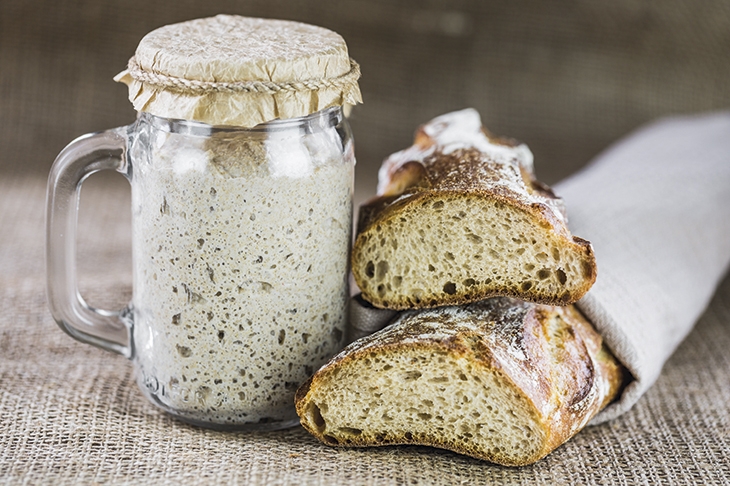I cannot claim the gift of prophecy, but early this year — before lockdown panic-buying and the warnings of a dire wheat harvest causing bread price rises — I became a bread-maker. I dug around on the internet for a good recipe for sourdough, and found one padded out with the usual bloggery and waffle. Absent the philosophy and the pious musings, it gives a clear, sensible route to bread self-sufficiency.
Sourdough doesn’t need bought-in yeast, only a ‘starter’ of flour and water. This is often called a ‘mother’, and attracts wild yeasts as it develops; after five days in the jar it is a gently bubbling ferment of living yeasts, and you keep it going by adding flour and water to it day by day. When my son was making his own bread at university, he left his mother at the back of the fridge for more than six months, and after a little feeding it revived, perhaps better than ever.
According to Bee Wilson’s The Way We Eat Now, the richer you are as a family or a nation, the less bread you will eat. The working classes expected a buttered slice with their tea, but we are more middle class these days. Yet the coronavirus has had a tremendous impact on our collective desire for bread — during lockdown Instagram was thickly leavened with photos of homemade sourdough. It is as if we have rediscovered our Christian roots. Man shall not live by bread alone, says Jesus; but the prayer he taught us puts it fair and square on the dining table — and it is as bread, after all, that he renews his compact with his followers at every Communion. Bread is the staff of life, and the first foodstuff to vanish from the supermarket shelves in times of crisis.
The word panic is derived from the Greek panikon, literally ‘pertaining to Pan’, the god of woods and fields, who was the source of mysterious sounds that caused contagious, groundless fear. It is not directly derived like the French pain from the Latin panicum, panic grass, which is a kind of millet. But the two share a single, distant ancestor in the Proto-Indo-European root sound ‘pa’, meaning to feed and protect, which turns up in words like pastor and pasture, the Latin panis, bread, and old English foda, food, as well as the name of the nature god.
So there is a relationship between bread and fear, between panis and panic. It is the fear of going without. It isn’t a fear that has much troubled us since the end of rationing almost 70 years ago, but the bread hasn’t been quite so nice since then, either. British bread took a strange turn at the outset of the war, with the creation of the National Loaf. The Federation of Bakers added calcium and vitamins to the dough and forced the production of a stodgy grey loaf popularly known as ‘Hitler’s secret weapon’.
Since then, most shop-bought breads have borne scant resemblance to the homemade sort. Given that bread is made, ideally, from flour, yeast, water and salt, the presence of literally dozens of other ingredients might make one pause before buying white slice, unless of course what one wanted wasn’t bread at all, but some confected pabulum (that ‘pa’ root again) to toast and slather in butter, like a schoolchild.
In times of scarcity and anxiety, though, it seems that we like to have proper bread back on our table again.






Comments